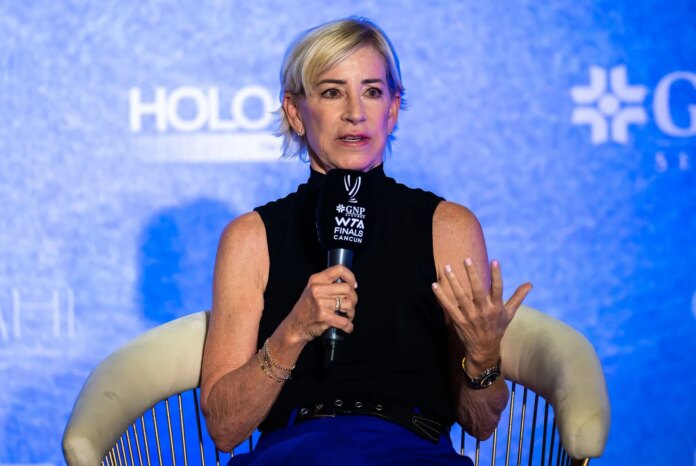Chris Evert once revealed how she truly felt about the harsh nicknames given to her during her professional tennis career. The American also shared her thoughts on whether modern players could be subjected to similar treatment. Evert earned several monikers during her time on tour, but the one that endured was ‘Ice Maiden’ because of her refusal to show her emotions on the court.
In a 2023 appearance on the Design Matters podcast, Chris Evert opened up about being called ‘Little Miss Metronome’ because of her elite defensive skills, while also being dubbed ‘Little Miss Money Bags’ simply because she followed Billie Jean King’s footsteps by speaking up about equal pay.
The 18-time Grand Slam champion also addressed the ‘Little Miss Icicle’ moniker, which was rooted in the perception that she was emotionally cold on the court. However, she explained that her composed demeanor stemmed from her mental toughness and desire to avoid being overcome by her feelings.
"I was called little miss metronome because all I did was just hit every ball back. I was called little miss money bags when I was speaking out for equal pay after Billy Jean kind of tutored me on that," Chris Evert said.
"But little miss icicle because their interpretation was that I was cold on the court. But I was just mentally tough and I was keeping everything inside. And as I said to you, before I realized at a young age that the more emotion you feel, it shuts you down. It shuts your mind down, it shuts your body down and you cannot play, relax, great tennis," she added.
Furthermore, Evert asserted that it would be seen as "very inappropriate" if such nicknames were bestowed upon modern players. Having transitioned to commentary after her retirement, the former World No. 1 disclosed that she had to closely monitor every critique she made about a player. In contrast, during her playing days, commentators could even call a player a "clown" and face no repercussions.
"Oh, no. It would be very inappropriate. That’s the word now. Inappropriate. I mean, I know that as a commentator, I have to watch everything I say about a player. If I say someone’s very athletic, that can also mean that they’re not mentally tough," she said.
"Trust me, I’ve been told these things. So it’s like in this day and age, I have to watch everything you say. In that day, you could say anything you wanted to. You could say somebody was a clown and you wouldn’t get in trouble," she added.
"You’d get blasted if you said that" - Chris Evert on reality of commentating in modern era

On the same podcast, Chris Evert reflected on how Nick Kyrgios had carried on the legacy of Jimmy Connors and John McEnroe as the "bad boy" of tennis but pointed out that the Australian was handled far more cautiously than players from her era.
Evert also expressed her belief that there was an excess of political correctness when it came to commentary, arguing that she was forced to sugarcoat her words because she would "get blasted" for pointing out that someone was playing poorly.
"Jimmy was the bad boy. And John McEnroe is the bad boy. And now it’s like, Kyrgios is sort of the bad boy, but they’re very cautious with how they explain it. It’s just so different now, which I don’t know good or bad, I don’t know which one. I don’t know which is better. I don’t know," Chris Evert said.
"I think we’re gone over a little bit too far with the… As a commentator, I would like to say, if somebody’s not playing well, somebody’s playing poorly even, if they’re really playing bad instead of saying, oh, I guess it’s not her day. Somebody’s playing poorly right now. She’s a much better tennis player, but you’d get blasted if you said that," she added.
Chris Evert's remarks stemmed from personal experience, having often faced backlash from tennis fans over her commentary at Grand Slam events.





